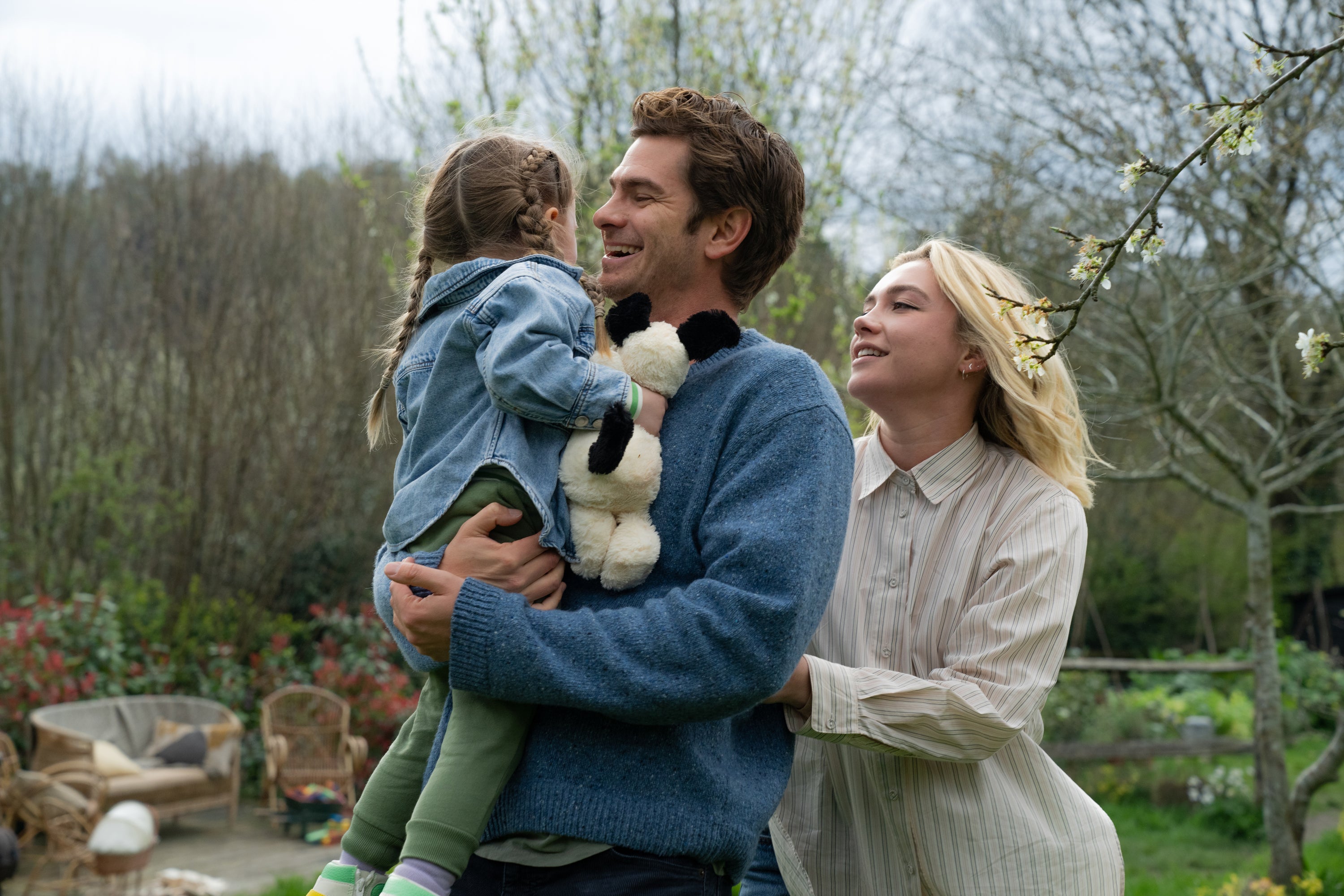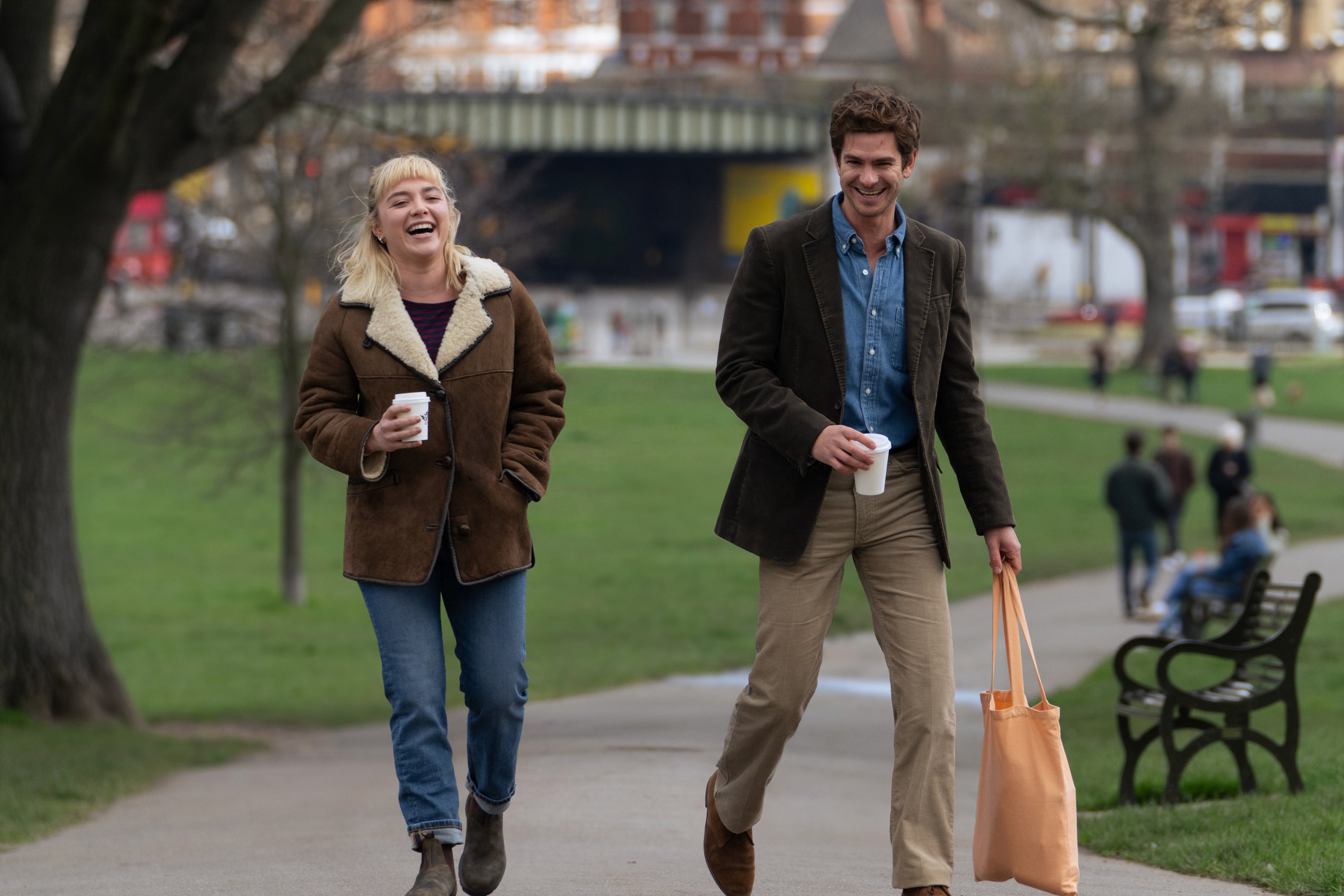Andrew Garfield: ‘Knowing we can lose everything we love is what makes life meaningful’
In the moments when everything is stripped back to basics – care, connection, comfort – we begin to understand what is really important. Here, the British actor tells Zoë Beaty about his new film ‘We Live in Time’ about caring for a partner with cancer and how, through grief and loss, we can find joy and meaning


Grief comes after the fact of death. That’s what we know, it’s what we do. From films and books and TV and awkward conversations, we learn to frame it; condition our temperance, adopt ways of getting through while the time of life ticks on and on, all the while contemplating what we bore witness to – which is that, in the end, time stops. After death, there’s a consensus: we grieve to give credence to the social order of things; a bit of denial, anger, some bargaining, depression and finally, if it comes, acceptance. Rarely does reality fit the specification.
Less spoken about is the grief that swarms around everyday life in the months, the years, or certainly the final days of helplessly watching and listening to someone who is dying. Here, in between life and death, it’s a bit more complicated. Medicine, fears, sickness, darkest humour, indignity, the rhythmic flow, in and out, of an air-inflated mattress on a hospital bed, keeping everyone around it afloat, are all a gauze over the regularities of other people’s lives. When there’s a world ending, right in front of you, the outside seems much smaller and much more silly.
Andrew Garfield remembers this period, the lead-up to the death of his mother from pancreatic cancer in 2019, well. “I think it was maybe the most profound period of my life because of the lessons learned, the awareness crashing in that this is all temporary,” he says. In the twilight, Garfield found that “colours become more vivid. Moments between strangers become more alive and vital and possible… A film can hit you in a deeper way.”
He’s speaking a few minutes after a small audience watched him play out this period once more in his new film, at a screening organised by Cancer Awareness Trust.
In We Live in Time, which will be released on New Year’s Day, Garfield stars alongside Florence Pugh in a simple story about living through love, young family life, ambition, success and terminal cancer. Almut (Pugh) is a chef – a very good one – while Tobias, played by Garfield, works for Weetabix. They meet when she runs him over, when he is mid-divorce and she is on a quest for a Michelin star.
Their south London love story unfolds in a sweet, slightly clunky, occasionally funny and moving series of non-sequential snapshots in time. In an opening scene, after Almut is told that her ovarian cancer has returned, a familiar purpose is set: what matters most now that time has contracted? Almut doesn’t want to live “passively” and painfully in treatment for what could be her final months. Tobias can’t contemplate Almut’s suggestion: that foregoing surgery and chemo for six great months together might feel better.

Garfield was a strong choice for the film. His own experience of caring for someone with terminal cancer lingers in tender stares and silences and in his character’s practical drive to get his partner’s last months “right”. He’s been applauded for speaking openly about his grief in the past – and, in west London, when we meet, he’s just as candid.
Some of her last words were about making sure a cardigan for her grandson got finished. She mustered the strength to make sure it was clear what button should be used, and what grid
In the aftermath of his mother’s death, Garfield “didn’t want to miss a single grain of grief. I understood very quickly that every ounce of grief I was feeling was this eternal, never-ending source of love for this person,” he tells the room. “And there was something very beautiful in that. When I would feel the grief, I could feel close [to my mum], who I was missing so greatly. It was only through grief that I could actually feel [that closeness] again.”
We Live in Time doesn’t deal with the aftermath of death, but the protracted lead-up to it, particularly after an acute diagnosis like cancer. Baked into the storyline are motifs about times and timings that matter: the long three minutes spent willing two lines to appear on a pregnancy test, a later scene shows Tobias meticulously documenting the gaps between contractions on a stopwatch as Almut goes into labour.
In her own pursuits, Almut is not only subjected to the time limit in her life, but in her career. Her determination to enter the Bocuse d’Or – the Olympics of Michelin-starred chefs – sees her literally fighting the clock to serve her courses. Almut’s storyline also speaks to an important, but overlooked part of cancer care: nutrition.
That’s what Sir Chris Evans, a professor who has spent his working life turning his scientific discoveries into new, practical medical treatments and therapies is now focused on. What you eat during treatment, he says, appearing on the panel alongside Garfield, can affect your chances of survival “because they enhance the performance of the cancer drug”, he explains – though most people don’t have access to the right knowledge in order to take advantage of it.
“Born out of that fact, we have to create some kind of system, a platform ... where we could put all this knowledge,” Evans, founder of global charity, Cancer Awareness Trust, explains. “So that’s what we’re building – a cancer platform – a system that’s free for everybody in the world to go on and put in some of their details, so that the system will talk to them about their cancer.”

Unlike Google and other systems, Cancer Platform won’t tell you too much, or cause more confusion. His work, alongside world-leading nutritionists, aims to inform both those already received cancer treatment, but also the population at large, especially younger generations, on how to eat well in order to help prevent a cancer diagnosis in the first place.
Looking after yourself, as well as managing your ambitions and wishes for navigating cancer and treatment is no easy task. But the film is a reminder – if somewhat on the nose – to make every second count. “It’s a life-affirming experience to know that we are going to die, to know that we will lose everything that we love – it’s actually the only thing that makes any of this meaningful,” Garfield explains.
That rare clarity of “now or never” really meaning right now or never can be a tonic. Those moments, and the joy of unfiltered intimacy when everything is stripped back to basics – care, connection, comfort – shift perspective in the right direction. In fact, while the days are inevitably hard, caring, sometimes in the smallest of ways – of preparing a meal that a person enduring chemo can taste and enjoy, moving a pillow or removing a sock that brings a moment of relief – becomes a privilege, says Garfield.
“I was in the privileged position of knowing her deeply enough, loving her deeply enough, I suppose, and being separated enough from this point in our lives where I could be a kind of death doula for her, in a way,” he explains.
“She was a woman of a certain generation, of a certain personality type that would have stayed alive and suffered beyond what was humanly possible in order to make other people feel less bad. In fact, some of her last words were about making sure a cardigan for her grandson got finished. She mustered the strength to make sure it was clear what button should be used, and what grid.
“That’s who she was, in essence, and I was given a privileged opportunity to give her permission, to let her know that we would survive, not knowing if we would, to be frank. But myself, my brother and my father are a very tight-knit family – we all had to prepare for each other.”
In this latest role, Garfield prepared himself once more – but, while he’s been asked frequently about what that entailed and how it felt (upsetting, difficult, cathartic?), for him those questions miss the point.
“I have a lot of people ask me a lot of questions, and they’re kind of leading questions, usually something along the lines of, ‘gosh, but wasn’t it so difficult to dive into these emotions? Didn’t you resist it, didn’t you want to avoid it, didn’t you want to run away? How did you let it go at the end of the day?” Garfield recounts.
Moments between strangers become more alive and vital… A film can hit you in a deeper way
“And I understand the kind of impulse to ask a question like that, because I think we are so conditioned in our particular culture to avoid the gritty, difficult dissent of grief and difficult feelings generally – I should put that in quotation marks; ‘difficult’ as in how our culture has framed those particular set of feelings. For me, for some reason, I found myself, I did lose my mother, longing to feel the loss as quickly and as deeply, as profoundly and as richly as possible.”
Confronting the waves of grief head-on has helped Garfield. “In one of the many stages, I dove into the Atlantic Ocean because there was so much I couldn’t release … I was anxious about being overwhelmed by it so I was holding on for dear life.
“Immersing myself in the ocean gave me such incredible immediate insight. Something happened where it was as if the ocean just gave me a bunch of information. It was basically like: ‘Yeah, we get it. You lost your mum. But here’s the thing, animals and humans have been losing their mothers since time immemorial, and it feels so unique to you right now. But you just joined a long line of other people who have lost their mothers. And I’m sorry to break it to you, but you’re not special.”
It’s true – as we all know, life is unique but death is universal. How we want to be remembered or remember another, how to put a pin on exactly what mattered in one life, and what it means that it’s suddenly ending, are the questions, really, that both terrify and drive us.
Garfield hopes that We Live in Time goes some way to helping others navigate them. “I hope that this film can be a little version or a big version of what that ocean gave me,” he adds. “I feel like it can be a hand reaching out to the screen to touch anyone who has had any kind of experience that is similar, or adjacent to the experience … To me, that is the best version of what art and creativity, and communal experience is.”
‘We Live in Time’ is out 1 January. Cancer Awareness Trust will be launching a new information site, Cancer Platform in the new year






Join our commenting forum
Join thought-provoking conversations, follow other Independent readers and see their replies
Comments